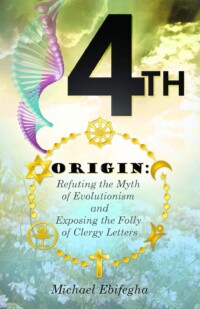Title: 4th Origin: Refuting the Myth of Evolutionism and Exposing the Folly of Clergy Letters
Author: Michael Ebifegha
Publisher: Leavitt Peak Press
ISBN: 1957956917
Pages: 190
Genre: Non-Fiction
Reviewed by: Liz Konkel
Pacific Book Review
4th Origin aims to address the science behind evolutionism and does so through clergy letters which are broken apart with a thorough examination. In this book, author Michael Ebifegha focuses on the failings presented in these letters by introducing the concept that clerics are failing to highlight the extent of God’s role in creation. Through an analytical approach, the arguments which are showcased specifically address the disregard of four specific things: addressing nations that honor God; the academic rights that scientists have; God as creator; and the 1992 declaration by the U.S. Supreme Court.
The book is well-researched and organized in a manner which lays out the arguments being presented – which makes it easy to understand what Ebifegha is saying. Every argument is backed with researched facts which give much credibility to the topic. For example, he shows a quote from author Perry Marshall explaining why the 2016 Royal Society Conference was important. The primary purpose is to back up the information through the facts and quotes provided, setting up the foundation for deeper research. Ebifegha does give readers a full picture in a way which allows you to understand what is being said, while also allowing readers to come to their own conclusions. The research included is vast including multiple sources – such as a discredited hypothesis by Jerry Coyne, theories from Darwin, and a 2008 booklet published by the National Academy of Sciences and Institute of Medicine. This gives the book a tone which is a cross between commentary and conversational, so it feels as if you’re taking part in a lecture. The tone is primarily analytic due to the extent of the research provided and the thorough assortment of facts and academic evidence.
4th Origin is narrowed on the topic of creation and evolution through the use of clergy letters. At the heart of this analysis is the Clergy Letter Project which establishes the unity over the teaching of Darwin’s theory. This is introduced early on in the book as a way to quickly tell you what to expect from the analysis, exploration, and commentary that followed. The writing is analytical, though easy to read, which makes this book appeal to those looking to explore deeper about the specific subject as well as an introduction to those who have no prior knowledge. The format is broken into key categories – such as the seven truths in the evolutionism-creationism controversy, follies in the evolution and creation clergy letters, and seven words of wisdom. These are also among the topics found in the chapters. It is important to note the book is not aiming to support either side of the Clergy Letter Project though presenting the facts so it has an openness which allows you to draw your own conclusions after reading. The content feels well-balanced with different perspectives such as Jonathan Wells, the Origin of Life Science Foundation, and Dr. Joseph.
The analytical approach makes this a tool that can be used in an academic setting while the writing makes the topic approachable for general reading, studying, and discussion. Other content you can find throughout includes references to Darwin, the origin of life, natural selection, and a creationism and evolutionism comparison table. Each reference stays under the topic of evolution and creation, helping to back the arguments Ebifegha makes.
It is clear that there has been much thought and time put into the research and organization of the book which makes 4th Origin well-developed, concise, thorough, and engaging. A must read for anyone who has not considered the nature of science or the necessity of God and His revelation for a coherent universe and further understanding of it.


